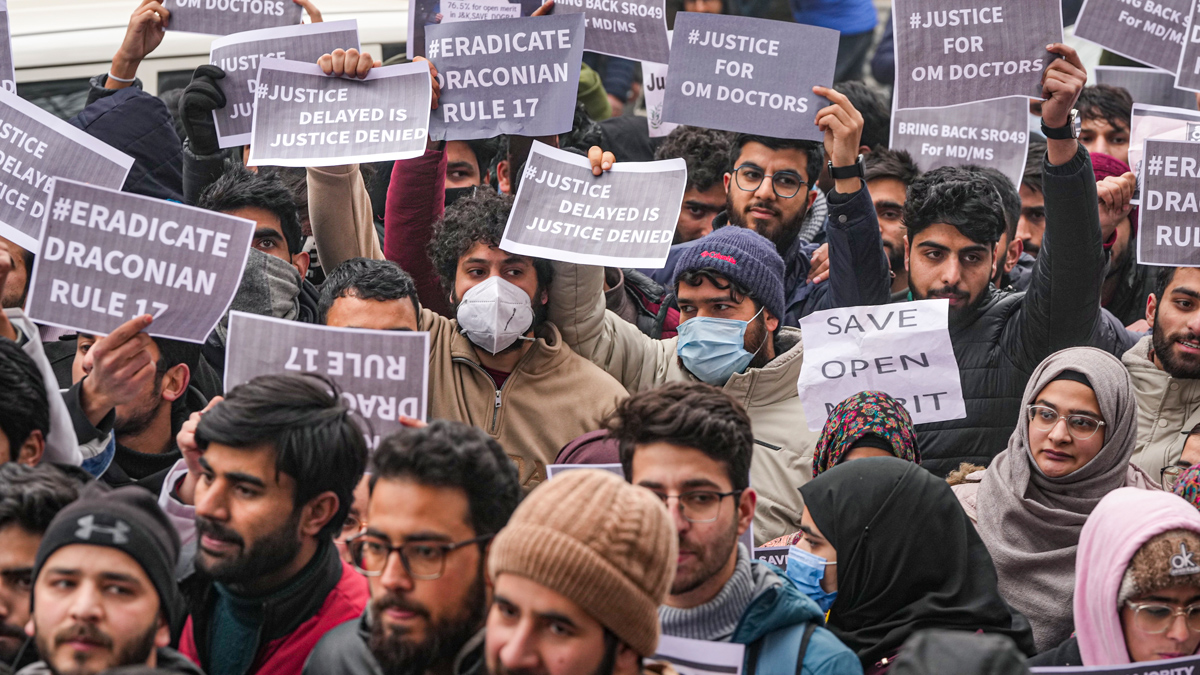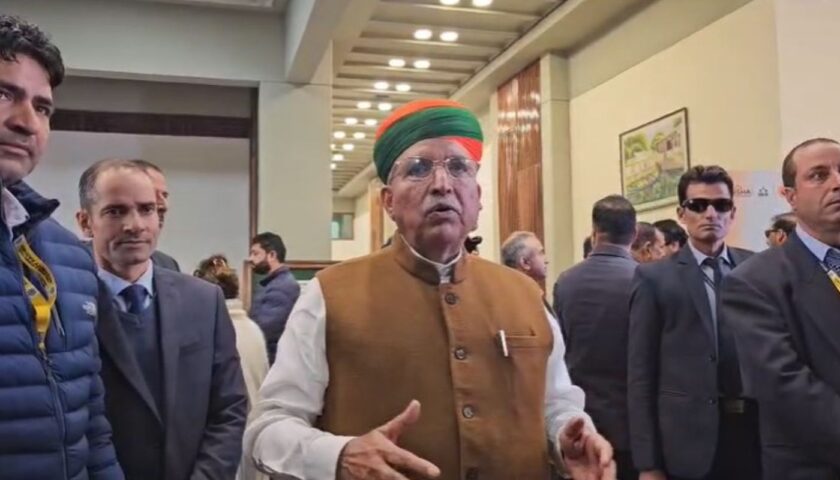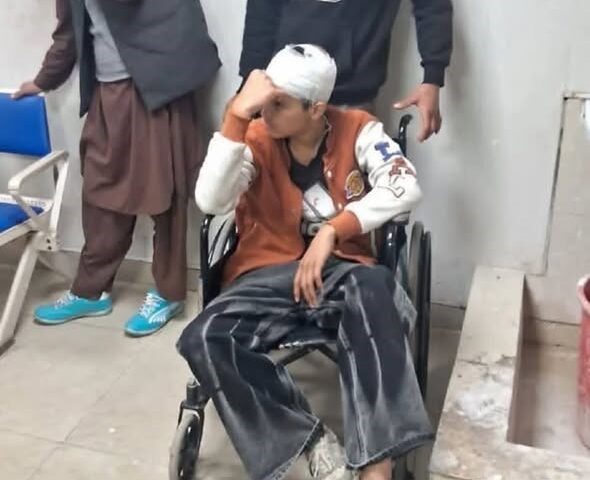Merit in Kashmir Under Threat: Is Reservation Policy Killing Hard Work?
By: Javid Amin | 21 Aug 2025
The Silent Collapse of Merit in Kashmir
In Kashmir today, the death of merit isn’t announced with headlines or slogans. It doesn’t come with the sound of breaking glass or mass protests. Instead, it’s quiet, systemic, and deeply corrosive.
Every young student in the valley grows up with one belief drilled into them: study hard, score high, and success will follow. For decades, this has been the lifeline of Kashmiri families. Parents sacrifice their limited earnings, often selling land or borrowing money, to fund coaching classes in Srinagar or Delhi. Students burn midnight oil preparing for exams like NEET, UPSC, or JKSSB.
But the bitter reality is that in today’s Jammu & Kashmir, merit alone no longer guarantees opportunity. A seat in a professional college, a government job, or even a fair shot at recognition depends on factors beyond intelligence or effort. Caste, political influence, financial privilege, and institutional bias overshadow the value of hard work.
This erosion of merit isn’t just an “education problem.” It is shaping the psychology of an entire generation. When merit collapses, hope collapses. And when hope dies, ambition turns into cynicism—a dangerous state for any society, especially one already grappling with conflict and instability.
Meritocracy: A Myth in Kashmir?
Meritocracy is supposed to be simple: if you work hard, perform better, and score higher, you should succeed. But in Kashmir, this idea has become more myth than reality.
The Kashmir Observer once wrote, “Rising is no longer about hard work. It’s about where you were born, who your parents know, and whether your surname opens doors.” This single line captures the essence of the crisis.
Let’s break it down:
-
Birth Privilege – Children from elite families, often politicians, bureaucrats, or wealthy businessmen, inherit more than property. They inherit networks, access to private schools, English-medium coaching, and exposure to competitive environments.
-
Institutional Capture – From universities to government recruitment boards, influence quietly seeps into decisions. Whether it is framing of syllabi, paper-setting, or hiring panels—those with connections rarely walk away empty-handed.
-
Cultural Domination – Even aesthetics are controlled. Elite families shape cultural norms, pushing English-medium elitism and Westernized standards as symbols of “merit,” sidelining rural or poor students who may be equally intelligent but lack polish.
This silent gatekeeping is dangerous because it kills aspiration at its roots. A farmer’s son from Kupwara may study as hard as a bureaucrat’s daughter in Srinagar, but the playing field isn’t level. When systemic inequality is normalized, meritocracy becomes a convenient slogan—used to motivate the poor, but rarely applied to reward them.
Reservation Policy in J&K: Numbers That Speak Volumes
The debate around reservation is not new in India. It was designed as a corrective measure to address centuries of caste discrimination and ensure representation for marginalized communities. But in Jammu & Kashmir, the balance between social justice and merit has tilted in ways that raise serious concerns.
The Numbers
Currently, around 54% of seats in higher education and government jobs in J&K are reserved across various categories. That leaves just 46% for general merit candidates.
In 2024, the government increased the Scheduled Tribe (ST) reservation by another 10%. With this change, the open merit share shrinks further to just 40%.
This means that out of every 100 seats:
-
54 are reserved based on caste, tribe, or other categories.
-
6 go to institutional quotas (sports, culture, internal quotas).
-
Only 40 remain for “general merit.”
For lakhs of aspirants, those 40 seats become the sole hope—creating a bottleneck that crushes thousands of hardworking students.
Real-Life Impact
Take the example of NEET (medical entrance). A Kashmiri student scoring 580/720 may still not secure a government MBBS seat if they fall in the “open merit” pool, while another student with 460/720 may qualify under a reserved quota.
This discrepancy creates resentment—not against communities benefiting from reservation, but against the system that pits students against each other unfairly.
Global Perspective
Globally, affirmative action exists, but with checks and balances. In the US, race-based quotas have been repeatedly challenged in courts, with universities encouraged to use diversity as a factor but not at the cost of excluding merit. In countries like Japan and South Korea, meritocracy is fiercely protected, with reservations limited mostly to socio-economic status rather than caste or tribe.
The problem in J&K is that the system hasn’t evolved with time. What was once designed to uplift has now turned into a vote-bank tool. Politicians expand quotas not necessarily to empower the marginalized, but to consolidate electoral loyalties. And in the process, “merit” becomes the first casualty.
The Creamy Layer Conundrum: Privilege Within Reservation
One of the biggest paradoxes in Kashmir’s reservation system is the “creamy layer” phenomenon.
The idea of a creamy layer was first introduced in India to ensure that reservation benefits truly reached the disadvantaged. It states that once a family from a reserved category reaches a certain socio-economic level, its children should no longer get reservation benefits.
But in J&K, this principle is often ignored or poorly implemented. The result?
-
Well-off families within reserved categories—bureaucrats, politicians, doctors, and business elites—continue to enjoy the benefits of quotas. Their children, already privileged with access to the best schools and coaching, often take seats meant for the truly marginalized.
-
Meanwhile, a poor student from a far-flung village in Gurez or Poonch, despite being from the same category, is left behind.
This creates a double injustice:
-
General merit students lose seats.
-
Disadvantaged reserved-category students get crowded out by their own “elite peers.”
A Real Example
Consider two students:
-
Student A – Daughter of a senior officer, educated in an elite Srinagar private school, trained at a Delhi coaching center.
-
Student B – Son of a daily wager from Rajouri, studying under a kerosene lamp, with no access to high-level coaching.
Both belong to the same reserved category. But when exams arrive, Student A scores higher—not necessarily because of ability, but because of privilege. The reserved seat goes to her. Student B’s dream ends there.
This irony exposes how the creamy layer undermines the true spirit of social justice.
The Emotional Toll: Dreams Deferred, Hope Diminished
Meritocracy isn’t just about numbers, ranks, or cutoffs—it’s about psychology. And when fairness collapses, the emotional toll on Kashmir’s youth is devastating.
Disillusionment Among Aspirants
Thousands of students from modest families spend years preparing for competitive exams. They sacrifice social lives, hobbies, even health. Parents often sell land or take loans to send their children for coaching in Srinagar or Delhi.
When, despite scoring well, these students are denied opportunities because of shrinking merit seats, the result is emotional burnout.
Many aspirants describe the feeling as being “punished for being born in the wrong category.”
Impact on Mental Health
-
Depression and Anxiety – Repeated rejection despite hard work leads to low self-esteem and clinical depression.
-
Brain Drain – Many talented students migrate outside J&K, contributing to an intellectual vacuum at home.
-
Cynicism – A belief grows that hard work doesn’t matter; only “contacts, caste, or cash” do.
Voices from the Ground
A medical aspirant recently said in an interview:
“I scored 590 in NEET but couldn’t get a government seat. Someone with 450 got it. How do I convince myself that studying harder would make a difference?”
This kind of disillusionment is not just personal—it’s societal. A whole generation risks disengaging from education, governance, and public life, feeling the system is rigged against them.
Social Stratification: The New Walls of Privilege
Merit in Kashmir isn’t just being killed by reservation and favoritism—it’s also being eroded by social stratification.
Symbols of Inequality
Walk through Srinagar today, and you’ll see ornamental gates, luxury villas, and lavish weddings with Bollywood-style décor. These are more than lifestyle choices—they’re symbols of exclusion.
The elite not only dominate institutions but also shape the social narrative. They set benchmarks for success, making it seem as though dignity comes not from knowledge or merit, but from wealth and display.
Education as a Divide
-
Elite families send children to Delhi Public School, Burn Hall, or international boarding schools.
-
Poorer families struggle with underfunded government schools lacking basic infrastructure.
By the time these students meet in competitive exams, the battle is already unequal.
Media and Culture
Even cultural and media spaces reflect this divide. English-speaking, well-dressed youth are showcased as “faces of modern Kashmir,” while rural achievers often remain invisible.
This creates a psychological exclusion, where many talented but modest-background students feel they don’t “fit” into the success narrative—even if they perform well academically.
Voices of Reform: A Growing Call to Save Merit
Despite the systemic challenges, the conversation around merit, fairness, and equality in Kashmir has started gaining momentum. Students, civil society groups, and digital activists are pushing back against the silent death of merit.
#DontKillTheMerit Movement
One of the most visible campaigns in recent years has been the #DontKillTheMerit movement. Spearheaded largely by students and young professionals, it uses social media as a platform to:
-
Highlight stories of hardworking aspirants who lost opportunities.
-
Question the continuous dilution of open merit seats.
-
Demand a review of reservation policies in light of current socio-economic realities.
This movement isn’t anti-reservation—it’s pro-balance. Its central message is simple:
Help the underprivileged, but don’t punish merit in the process.
Legal and Policy Voices
Some legal experts argue that J&K needs a rationalized quota policy, one that:
-
Periodically reviews the socio-economic status of beneficiaries.
-
Implements the creamy layer concept more strictly.
-
Ensures that reservations don’t exceed 50%, in line with Supreme Court guidelines (except in exceptional cases).
Policy analysts also suggest that instead of expanding quotas endlessly, the government should improve the quality of government schools, coaching facilities, and scholarships. That way, opportunities are expanded for everyone, not just redistributed.
Civil Society & Educators
Teachers and educationists across Kashmir often lament how students lose motivation. As one Srinagar-based professor put it:
“When merit is suffocated, society loses its brightest minds. We’re producing a generation that feels betrayed by the very system meant to empower them.”
Civil society groups have begun organizing seminars and debates, ensuring that the issue isn’t buried under political noise.
Building a Fair Future: What Can Be Done?
If merit is dying a silent death in Kashmir, revival requires bold, honest, and humane reforms. Solutions won’t be easy, but they’re possible.
1. Rationalize Reservation
-
Limit Over-Expansion – Keep reservations within reasonable limits so that open merit doesn’t shrink endlessly.
-
Dynamic Review – Categories should be reviewed every 10 years to check whether they still need quotas.
-
Enforce Creamy Layer – Strict income and property checks must ensure that benefits go only to the genuinely disadvantaged.
2. Strengthen Public Education
The real solution to inequality isn’t just redistribution—it’s capacity building.
-
Upgrade government schools with better infrastructure, libraries, labs, and digital access.
-
Train teachers and reduce dropout rates in rural areas.
-
Provide free or subsidized coaching for competitive exams, ensuring level playing field.
3. Transparent Recruitment
-
Adopt digital, tamper-proof recruitment processes that minimize corruption and favoritism.
-
Publicly release merit lists, cutoffs, and evaluation parameters for accountability.
4. Mental Health Support for Aspirants
The emotional toll on Kashmiri youth cannot be ignored. Institutions should:
-
Provide counseling services.
-
Destigmatize conversations around exam stress, failure, and depression.
-
Offer alternative career guidance for students who don’t crack top exams.
5. Celebrating Merit Beyond Exams
Merit should not be confined to marksheets—it should include creativity, innovation, and problem-solving.
-
Encourage student research, hackathons, and entrepreneurship.
-
Highlight rural achievers and unsung innovators in media and cultural platforms.
Bottom-Line: Will Kashmir Let Merit Live Again?
The death of merit in Kashmir is not sudden—it’s been slow, silent, and systematic. Policies designed for equity have, over time, become tools of inequality. Reservation, favoritism, social stratification, and lack of accountability have created an environment where hard work is undervalued, and privilege gets recycled.
But hope isn’t lost. The fact that students are speaking up, civil society is engaging, and debates are intensifying means meritocracy can still be revived.
If Kashmir wants to build a future of fairness, it must embrace a dual vision:
-
Justice for the disadvantaged through support and opportunity.
-
Respect for merit through recognition and reward.
Because when merit dies, society doesn’t just lose fairness—it loses its future thinkers, doctors, scientists, leaders, and innovators. Kashmir cannot afford that.




